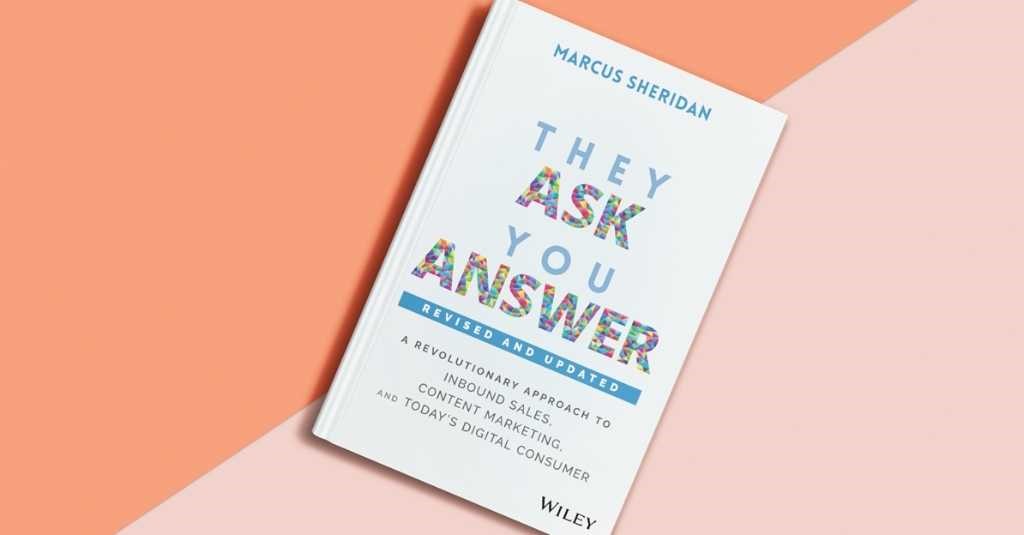Google frequently make changes to their algorithm, and we’re always trying to adjust and make sure we’re optimising our websites for SEO.
However, there’s always been one thing that we’ve always focused on making sure we do, and now Google is telling us that we need to do it.
That is, focusing on writing content that is actually helpful to our audience. Why is this important enough to write an article about? Because writing helpful content is a step-by-step process that isn’t necessarily easy to do.
We follow a framework called They Ask You Answer (TAYA) which is centred around the idea of producing content for users that answers their biggest questions and concerns. Using TAYA principles, we’ve guided clients to write amazing articles that both Google and sales teams love.
By following this framework and the specific steps TAYA teaches, Google’s new algorithm update won’t be a problem for you at all.

In this article, we’re going to cover the following:
Key Points of Google’s New Algorithm Update

Google titled their new update “helpful content update” which targets content that is not helpful to people.
You know those generic tips your SEO agency shoves down your throat around keyword stuff, yeah, that’s officially a waste of your time.
It focuses on finding content that has been written for the purpose of ranking in search engines that does not help or inform people, and ensure that this type of content does not rank highly in search. This update rolled out on August 25th 2022 and it changes everything.
Here’s what we know so far about the new update.
Site-wide Algorithm
This is a sitewide algorithm, meaning that if the algorithm determines that a proportion of your content is unhelpful to people, your entire site will be flagged and impacted.
This is important, because it means we can’t trick Google by moving the unhelpful content to a subfolder or subdomain. Instead, the only option is to remove that content or make it helpful to people.
Several Months Validation Period
This content update system is automated, meaning that it regularly evaluates content on your site. Despite this, if you fix your content today, that does not mean your site will recover tomorrow.
This is because there is a several month validation period, where you must prove to Google that you are really committed to updating your content over the long term and not just today. In other words, this new update requires you to prove to Google over several months that your content is helpful in the long term.
Why is this important? Because it means that the way you write content must change moving forward – permanently.
Why The Helpful Content Update?
Google’s main feedback from users for Search is that they are not happy with the quality of some of the content they discover on Google. As such, Google is focusing on rewarding sites that are helpful to users, in an attempt to solve these quality issues.
Dealing With Google’s New Algorithm Update With They Ask You Answer
They Ask You Answer (aka TAYA) is a practical framework and sales and marketing philosophy that assumes one simple truth: if your prospect or customer asks a question, you answer, and in doing so, you will become the most trusted voice in your space and will gain more business than you ever have before.

Building value, trust and being helpful is baked into the way They Ask, You Answer teaches you to write articles.
In order to make this method work, we must do the following:
- Conduct research to better understand customer questions and concerns.
- Speak directly to our sales team to understand customer questions and concerns.
- Create blog articles and videos around each of these questions/desires.
If you want a deeper dive into this framework, check out this article.
TAYA by nature forces us to write content that is DIRECTLY helpful to users because it focuses on addressing customer questions and concerns. If we focus on following this system, Google’s new algorithm update won’t be an issue for us at all.
Is there anything else I can do to deal with this update?
Google also released a set of questions you can ask yourself about your content to check how it will measure up with this new update.
Answering yes to some or all of the questions below is a warning sign that you need to update your content according to this update.
- Is the content primarily to attract people from search engines, rather than made for humans?
- Are you producing lots of content on different topics in hopes that some of it might perform well in search results?
- Are you using extensive automation to produce content on many topics?
- Are you mainly summarizing what others have to say without adding much value?
- Are you writing about things simply because they seem trending and not because you’d write about them otherwise for your existing audience?
- Does your content leave readers feeling like they need to search again to get better information from other sources?
- Are you writing to a particular word count because you’ve heard or read that Google has a preferred word count? (No, we don’t).
- Did you decide to enter some niche topic area without any real expertise, but instead mainly because you thought you’d get search traffic?
- Does your content promise to answer a question that actually has no answer, such as suggesting there’s a release date for a product, movie, or TV show when one isn’t confirmed?
Answering yes to the below questions means you’re most likely on the right track with Google’s new update.
- Do you have an existing or intended audience for your business or site that would find the content useful if they came directly to you?
- Does your content clearly demonstrate first-hand expertise and a depth of knowledge (for example, expertise that comes from having actually used a product or service, or visiting a place)?
- Does your site have a primary purpose or focus?
- After reading your content, will someone leave feeling they’ve learned enough about a topic to help achieve their goal?
- Will someone reading your content leave feeling like they’ve had a satisfying experience?
- Are you keeping in mind our guidance for core updates and for product reviews?
So, what’s next?
If you really want to make sure that you are positively impacted by this new update, then you should do the following:
- Read this article about everything to do with the They Ask You Answer framework.
- Read this article about how to produce quality content.
- Follow the action steps in the above two articles.
If you do just these things, you’ll be ready to tackle this new change.












